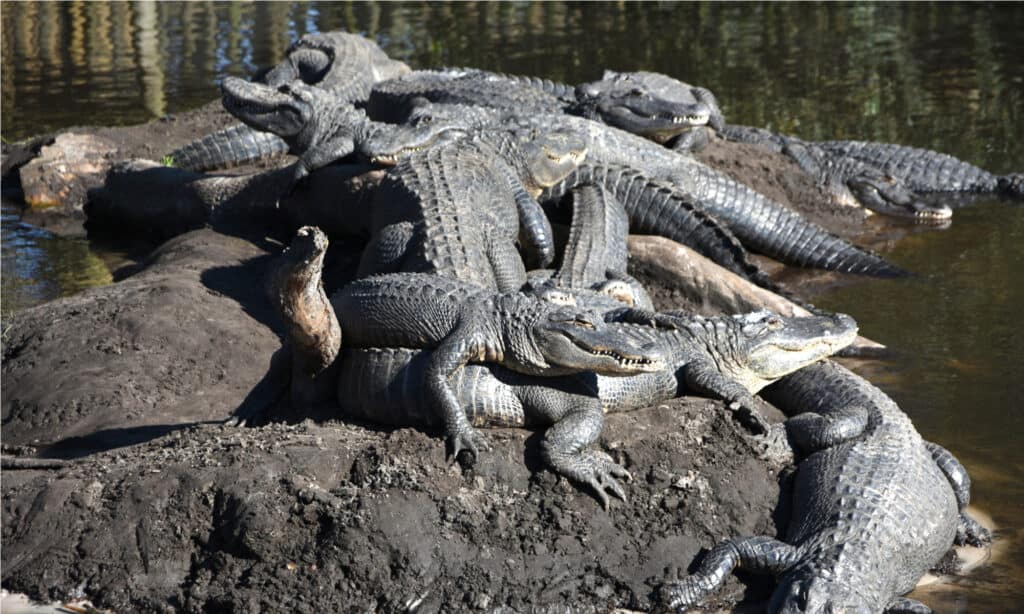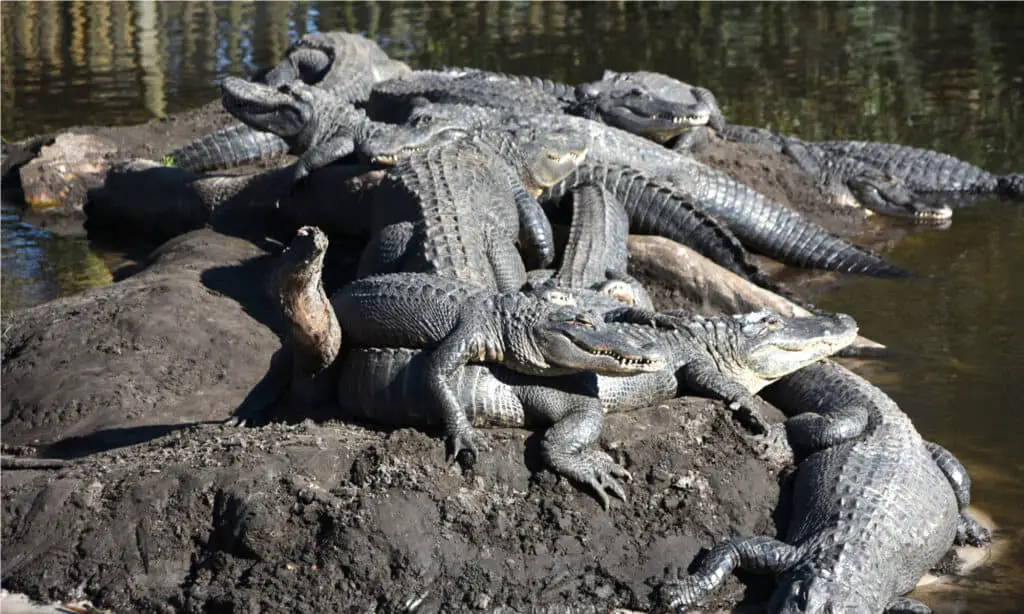If you’ve ever explored the swamps and wetlands of Louisiana, you’ve probably come across these prehistoric-looking creatures with wide mouths and sharp teeth – alligators. Louisiana is known for its large alligator population, but have you ever wondered just how many alligators are actually living in the state?
According to the Louisiana Department of Wildlife and Fisheries, there are an estimated 2 million alligators living in Louisiana. That’s right, 2 million! In fact, Louisiana has the largest alligator population of any state in the country. But how did these reptiles become so prevalent in the state, and what does it mean for the people who call Louisiana home? Let’s dive in and find out!
Louisiana is home to an estimated 2 million alligators, making it the state with the largest alligator population in the United States. The alligator population is spread throughout the state, with the majority found in the southern regions near the swamps and bayous.

How Many Alligators Are in Louisiana?
Louisiana is known for its population of alligators, but just how many of them are there? It’s a question that many people have asked, but few have been able to answer accurately. In this article, we will explore the alligator population in Louisiana and provide you with some fascinating information on these creatures.
The History of Alligators in Louisiana
Alligators have been a part of Louisiana’s ecosystem for thousands of years. They have played a significant role in the state’s history and culture, particularly in the Cajun community. In fact, alligator hunting has been a part of Louisiana’s economy for over 300 years.
During the 20th century, the alligator population in Louisiana was in decline due to overhunting. However, in the 1960s, the state implemented a conservation program that helped to increase the alligator population. Today, Louisiana has the largest alligator population in the United States, with an estimated 2 million alligators.
The Alligator Population in Louisiana
As previously mentioned, Louisiana has the largest alligator population in the United States. The state has an estimated 2 million alligators, which is more than the total number of people living in the state. Alligators can be found in every parish (county) in Louisiana, and they are often seen in swamps, lakes, and rivers.
Alligators are an important part of Louisiana’s ecosystem. They help to control the population of certain animals, such as nutria, which can damage wetland habitats. Additionally, alligator hunting is an important part of Louisiana’s economy, generating millions of dollars in revenue each year.
The Benefits of Alligators
Alligators are not just fascinating creatures; they also provide several benefits to Louisiana’s ecosystem. Alligators play a crucial role in maintaining the balance of wetland habitats by controlling the population of certain animals. They also help to disperse seeds and nutrients throughout the wetlands, which helps to promote plant growth.
Alligator hunting is also an important part of Louisiana’s economy. It provides jobs for many people, including hunters, processors, and retailers. Additionally, alligator products, such as hides and meat, are exported around the world, generating millions of dollars in revenue for the state.
The Risks of Alligators
While alligators provide several benefits, they can also pose a risk to humans. Alligators are wild animals and should be treated with caution and respect. It is important to remember that alligators are predators and can be dangerous if provoked.
To reduce the risk of alligator attacks, it is important to follow some simple safety guidelines. These include staying away from alligators, especially during mating season, not feeding alligators, and keeping pets on a leash near bodies of water.
Alligator Conservation in Louisiana
Alligator conservation is an important part of Louisiana’s ecosystem. The state has implemented several programs to help protect the alligator population. These include regulating alligator hunting, monitoring alligator populations, and educating the public on alligator safety.
Additionally, the state has established several alligator farms, which help to increase the alligator population and provide a sustainable source of alligator products.
Alligator vs. Crocodile
Alligators and crocodiles are often confused with each other, but they are different species. Alligators are found in the United States and China, while crocodiles are found in Africa, Australia, and South America.
One of the main differences between alligators and crocodiles is their snouts. Alligators have a wide, rounded snout, while crocodiles have a narrow, pointed snout. Additionally, alligators are less aggressive than crocodiles and are more likely to avoid humans.
Alligator Farming in Louisiana
Alligator farming is an important part of Louisiana’s economy. The state has over 300 alligator farms, which provide jobs for many people and generate millions of dollars in revenue each year.
Alligator farming is a sustainable way to produce alligator products, such as hides and meat, without depleting the wild alligator population. Additionally, alligator farming helps to ensure the survival of the alligator species.
Alligator Hunting in Louisiana
Alligator hunting is a popular activity in Louisiana, and it has been a part of the state’s culture and economy for over 300 years. Alligator hunting is regulated by the state, and hunters must have a license to hunt alligators.
Alligator hunting is done in a sustainable manner, which helps to ensure the survival of the alligator population. Additionally, alligator hunting provides jobs for many people, including hunters, processors, and retailers.
Alligator Tourism in Louisiana
Alligator tourism is a popular activity in Louisiana. Many people come to the state to see alligators in their natural habitat or to visit alligator farms. Alligator tourism provides jobs for many people, including tour guides, hotel staff, and restaurant workers.
Alligator tourism also helps to educate the public on the importance of alligator conservation and safety. It provides an opportunity for people to learn about these fascinating creatures and to appreciate their role in Louisiana’s ecosystem.
Alligator Conservation and Safety
Alligator conservation and safety are important issues in Louisiana. It is important to remember that alligators are wild animals and should be treated with caution and respect. To reduce the risk of alligator attacks, it is important to follow some simple safety guidelines.
Additionally, alligator conservation is crucial to the survival of the alligator species and the maintenance of Louisiana’s ecosystem. The state has implemented several programs to help protect the alligator population, and it is important for everyone to do their part to ensure the survival of these fascinating creatures.
Frequently Asked Questions
Here are some common questions people ask about alligators in Louisiana:
What is the history of alligators in Louisiana?
Alligators have been in Louisiana for millions of years. Native Americans hunted them for food and used their hides for clothing and other items. In the early 1900s, alligators were almost hunted to extinction for their hides, but conservation efforts have helped bring them back.
Today, alligators are an important part of Louisiana’s ecosystem and are a popular attraction for tourists and hunters.
How many alligators are in Louisiana?
It is difficult to determine exactly how many alligators are in Louisiana because they live in swamps, marshes, and other remote areas. However, it is estimated that there are about 2 million alligators in the state. Alligators are found in all 64 parishes (counties) in Louisiana.
Alligators are a valuable resource in Louisiana and are managed through hunting seasons and other regulations to ensure their populations remain healthy.
What is the size of an average alligator in Louisiana?
The average size of an alligator in Louisiana is about 10 feet long and 300-400 pounds. However, alligators can grow much larger. The largest alligator ever recorded in Louisiana was over 19 feet long and weighed over 2,000 pounds!
Alligators grow quickly in their first few years of life but slow down as they get older. It can take up to 20 years for an alligator to reach its full size.
What do alligators eat in Louisiana?
Alligators in Louisiana eat a variety of prey, including fish, turtles, snakes, birds, and small mammals. They are opportunistic hunters and will eat whatever is available. Alligators have a powerful digestive system and can even digest bones and shells.
Alligators are at the top of the food chain in Louisiana’s wetlands and play an important role in maintaining the ecosystem.
Are alligators dangerous in Louisiana?
Alligators can be dangerous if they are provoked or feel threatened. However, alligator attacks on humans are rare in Louisiana. Most alligator attacks occur when people are swimming in areas where alligators are known to live, or when people get too close to alligators while fishing or hunting.
It is important to always be aware of your surroundings when in alligator habitat and to follow safety guidelines to avoid any potential conflicts with these amazing creatures.
Alligator Swamp Tour in Louisiana (HD)
In conclusion, the number of alligators in Louisiana is estimated to be around 2 million. This makes Louisiana the state with the largest alligator population in the United States. This number is not only impressive but also highlights the importance of conservation efforts to protect these fascinating creatures.
Despite the large number of alligators in Louisiana, they are still considered a threatened species due to habitat loss and hunting. The state of Louisiana has taken significant steps to protect alligator populations, including setting limits on hunting and implementing conservation programs.
In summary, the question of how many alligators are in Louisiana may seem like a simple one, but it highlights the importance of conservation efforts and the need to protect these amazing animals for future generations to enjoy. With continued efforts, we can ensure that Louisiana remains home to a thriving population of alligators for many years to come.


